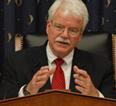Wages and Benefits
Key Legislation:
Minimum Wage Increase »
Nearly two-thirds of Americans obtain health coverage either through their employer or their spouses’ employer. As the unemployment and underemployment rates continue to grow, so will the number of uninsured. Even if these workers get another job, they likely face lower pay, fewer benefits and little access to affordable health care.
The American Recovery and Reinvestment Act will assist these workers by providing access to their former employer’s group health plan through enrollment in COBRA coverage beyond the current limit of 18 months. In addition, it will assist recently laid-off workers in receiving affordable COBRA coverage by covering a portion of the monthly premium. The nonpartisan Congressional Budget Office estimates that this package would help 8.2 million people keep health care coverage for themselves and their families.
“After eight years of disastrous policies that have steamrolled workers and our economy, this President has done enough harm,” said U.S. Rep. George Miller (D-CA), the chairman of the House Education and Labor Committee. “At a time when too many Americans are seeing their jobs and wages slip away, it’s despicable that this is how the Bush administration is spending its final days. I hope the new administration will work with us to quickly overturn this and other last-minute rules that open the door to more abuse in the guest worker programs and threaten the livelihoods of all workers in this country.”
 The American economy could slip into a deeper recession unless immediate action is taken to stem the tide of rising unemployment and falling family incomes, witnesses told the Committee in a hearing today.
The American economy could slip into a deeper recession unless immediate action is taken to stem the tide of rising unemployment and falling family incomes, witnesses told the Committee in a hearing today. “The Growing Income Gap in the American Middle Class”
Thursday, July 31, 2008, 10:00 a.m. EDT
The increase in the minimum wage comes at an important time for the millions of Americans struggling to make ends meet. Real incomes have dropped since 2001, while the costs of gasoline, health insurance, and attending college have skyrocketed. With today’s increase, Americans who most urgently need a pay raise will get a badly needed boost.
The House Education and Labor Committee held a hearing on Tuesday, July 15 to examine the U.S. Department of Labor's record of enforcing the nation's wage and hour laws. The Government Accountability Office highlighted the results of two separate investigations requested by the chairman of the committee, U.S. Rep. George Miller (D-CA), into the Labor Department’s failures to fully investigate and properly address violations of the law.
Seventy years ago last month, President Franklin Roosevelt signed the landmark Fair Labor Standards Act into law. The law has provided generations of Americans with basic rights to minimum wages, overtime pay, and a ban on oppressive child labor. However, critics say that the Bush administration has failed to protect workers from a growing problem of "wage theft" by adopting weak approaches to enforcement and reducing funding and staffing levels of the Wage and Hour Division, the agency responsible for investigating complaints of wage, hour, and child labor violations.
The Committee will hold a hearing on Tuesday, July 15 to examine the U.S. Department of Labor’s record of enforcing the nation’s wage and hour laws. The Government Accountability Office will highlight the results of two separate investigations requested by Chairman George Miller into the Labor Department’s failures to fully investigate and properly address violations of the law. Seventy years ago last month, President Franklin Roosevelt signed the landmark Fair Labor Standards Act into law. The law has provided generations of Americans with basic rights to minimum wages, overtime pay, and a ban on oppressive child labor. However, critics say that the Bush administration has failed to protect workers from a growing problem of “wage theft” by adopting weak approaches to enforcement and reducing funding and staffing levels of the Wage and Hour Division, the agency responsible for investigating complaints of wage, hour, and child labor violations.
